

The Happy Planet Index. We’ve written before about alternative measures to gross domestic product.
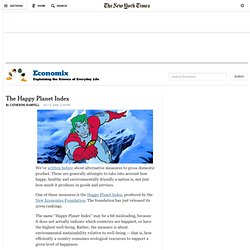
These are generally attempts to take into account how happy, healthy and environmentally friendly a nation is, not just how much it produces in goods and services. One of these measures is the Happy Planet Index, produced by the New Economics Foundation. The foundation has just released its 2009 rankings. The name “Happy Planet Index” may be a bit misleading, because it does not actually indicate which countries are happiest, or have the highest well-being.
Rather, the measure is about environmental sustainability relative to well-being — that is, how efficiently a country consumes ecological resources to support a given level of happiness. It is calculated based on “average years of happy life,” as measured by life satisfaction and life expectancy. Mesurer le bien-être : redéfinir le progrès. Critique du Produit National Brut Le Produit National Brut (PNB) des États-Unis d’Amérique a plus que doublé ces cinq dernières décennies.
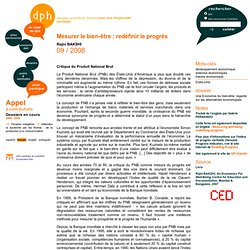
Mais les chiffres de la dépression, du divorce et de la criminalité ont augmenté au même rythme. En fait, ces formes de détresse sociale participent même à l’augmentation du PNB car ils font circuler l’argent, les produits et les services : la vente d’antidépresseurs injecte ainsi 10 milliards de dollars dans l’économie américaine chaque année. Le concept de PNB n’a jamais visé à refléter le bien-être des gens, mais seulement la production et l’échange de biens matériels et services marchands dans une économie.
Pourtant, après la seconde guerre mondiale, la croissance du PNB est devenue synonyme de progrès et a déterminé le statut d’un pays dans la hiérarchie du développement. Au cours des années 70 et 80, la critique du PNB comme mesure du progrès est devenue moins marginale et a gagné des voix dans le courant dominant. Rapport[mesure des performances eco et du progrès social] Environmental Monitoring and Assessment, Volume 86, Numbers 1-2. Développement durable, progrès social : des indicateurs alternatifs. On assiste, depuis le milieu des années 90, à une floraison d’initiatives internationales, émanant selon les cas de chercheurs, d’associations et d’ONG, d’institutions statistiques, ou d’organisations internationales, visant à évaluer la richesse ou le "progrès" sur la base d’indicateurs "alternatifs".
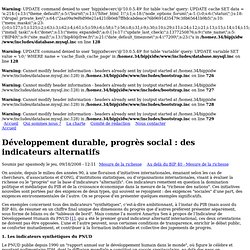
Ces indicateurs remettent en question la domination politique et médiatique du PIB et de la croissance économique dans la mesure de la "richesse des nations". Ces initiatives nouvelles sont portées par des exigences de deux types, qui souvent se rejoignent : des exigences "sociales" d’une part, des exigences environnementales de l’autre. On se propose d’en présenter quelques exemples significatifs. 38303257. Personal Finance: The pursuit of happiness. When I ask that question, what aspects of your life immediately leap to mind?
Do you think of your significant other, smile, and nod yes, you're happy? Do you measure it by how often you've laughed or felt at peace? Or did you do a quick accounting of your financial well-being as a way to gauge your contentedness? Money can buy one form of happiness, massive global study concludes. Money, it turns out, really can buy you happiness -- or at least one form of it, according to the biggest study to examine the relationship between income and well-being around the world. Pulling in the big bucks makes people more likely to say they are happy with their lives overall -- whether they are young or old, male or female, or living in cities or remote villages, the survey of more than 136,000 people in 132 countries found. But the survey also showed that a key element of what many people consider happiness -- positive feelings -- is much more strongly affected by factors other than cold, hard cash, such as feeling respected, being in control of your life and having friends and family to rely on in a pinch.
"Yes, money makes you happy -- we see the effect of income on life satisfaction is very strong and virtually ubiquitous and universal around the world," said Ed Diener, a professor emeritus of psychology at the University of Illinois who led the study. Want to be happy? More money won't tip the balance. Perhaps it's a function of being in my 30s with small children to support or of being a freelance journalist in lean times or of living in the relatively expensive D.C. metro area, but if I had a dollar for every time I thought my life would be just a little better if we had more money, well, I'd be rich.
But would I be any happier? Not necessarily. A new study from Princeton University shows that money can help buy happiness, but only up to a point -- about $75,000 in annual household income, to be exact. Above that amount, more cash has no effect on "emotional well-being," or how elated, sad or stressed you feel on a day-to-day basis, according to the research. Clinical psychologist Robin Haight, for one, says this finding backs up what she sees in her clinical practice in Tysons Corner: "There is no shortage of misery among the middle and upper middle classes and even the well-to-do who live in this particular area," she says. Pauvreté richesse et bonheur [jean christian lamblet] 7 life lessons from the very wealthy. Please excuse the very wealthy for feeling a bit under siege lately.
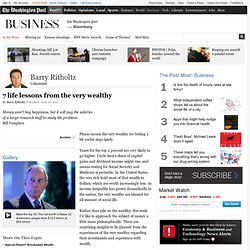
Taxes for the top 2 percent are very likely to go higher. Uncle Sam’s share of capital gains and dividend income might rise, and means-testing for Social Security and Medicare is probable. In the United States, the very rich hold most of that wealth in dollars, which are worth increasingly less. As income inequality has grown dramatically in the nation, the very wealthy are blamed for all manner of social ills. Rather than pile on the wealthy, this week I’d like to approach the subject of money a little more philosophically. The affluence paradox-rapport.
Affluence Paradox.doc. Paradoxe d’Easterlin. Rapport Stiglitz. Alternatives Economiques : actualité économique et sociale, information économique et sociale. Economie : Stiglitz met l'individu au centre de l'économie. Le Figaro s'est procuré le rapport Stiglitz, qui doit être remis lundi au gouvernement.
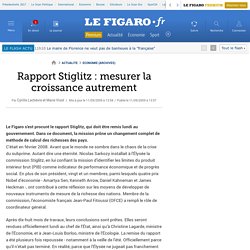
Dans ce document, la mission prône un changement complet de méthode de calcul des richesses des pays. C'était en février 2008. Avant que le monde ne sombre dans le chaos de la crise du subprime. Autant dire une éternité. Le rapport Stiglitz préconise de mesurer le bien-être. 42613423. Après le rapport Stiglitz, comment mesurer la richesse ? Lancer le dbat public sur la mesure de la richesse. Beyond GDP: How Do We Measure Real Wealth and Happiness? When I was 21, I told my father that I didn't want to work with him any longer at the ice cream company he co-founded, Baskin-Robbins, and I didn't want to depend on his financial achievements.
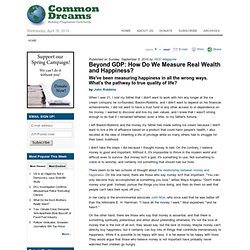
I did not want to have a trust fund or any other access to or dependence on his money. I wanted to discover and live my own values, and I knew that I wasn't strong enough to do that if I remained tethered, even a little, to my father's fortune. I left Baskin-Robbins and the money my father had made selling ice cream because I didn't want to live a life of affluence based on a product that could harm people's health.
I also recoiled at the idea of inheriting a life of privilege while so many others had to struggle for their basic livelihood. I didn't take the steps I did because I thought money is bad. There seem to be two schools of thought about the relationship between money and happiness: On the one hand, there are those who say money isn't that important. Why money is like beer. KS-BU-10-002-EN. Beyond GDP - About Beyond GDP. The Beyond GDP initiative is about developing indicators that are as clear and appealing as GDP, but more inclusive of environmental and social aspects of progress.
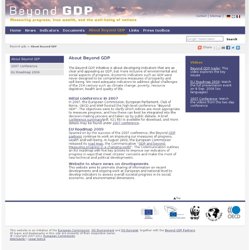
Economic indicators such as GDP were never designed to be comprehensive measures of prosperity and well-being. We need adequate indicators to address global challenges of the 21 st century such as climate change, poverty, resource depletion, health and quality of life. Initial conference in 2007 In 2007, the European Commission, European Parliament, Club of Rome, OECD and WWF hosted the high-level conference “Beyond GDP”. The objectives were to clarify which indices are most appropriate to measure progress, and how these can best be integrated into the decision-making process and taken up by public debate. EU Roadmap 2009. Life Satisfaction. Nous sommes plus riches donc plus heureux ? - S.O.S... S.E.S ? ... Je blogue !
Nous avons montré précedemment que le niveau de vie avait beaucoup plus progressé que les statistiques ne peuvent le laisser croire.
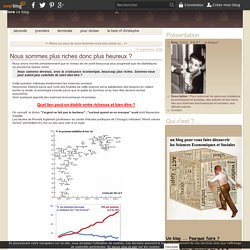
Nous sommes devenus, avec la croissance économique, beaucoup plus riches. Sommes-nous pour autant plus satisfaits de notre bien être ? Cette question intéresse évidemment les sciences sociales: l'économie d'abord parce que l'une des finalités de cette science est la satisfaction des besoins en luttant contre la rareté, la sociologie ensuite parce que la quête du bonheur et du bien être devient central aujourd'hui.Voici quelques apports des sciences économiques et sociales.
Le « Bonheur National Brut à la Française », GLOBECO fait une première proposition. Peut-on mesurer le bonheur? Happiness economics. Subject classifications[edit] The subject may be categorized in various ways, depending on specificity, intersection, and cross-classification.
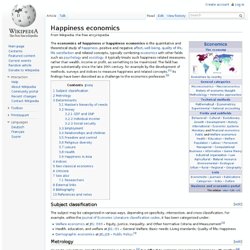
For example, within the Journal of Economic Literature classification codes, it has been categorized under: Welfare economics at JEL: D63 – Equity, Justice, Inequality, and Other Normative Criteria and Measurement[1]Health, education, and welfare at JEL: I31 – General Welfare; Basic needs; Living standards; Quality of life; Happiness[3]Demographic economics at JEL:J18 – Public Policy.[4] Metrology[edit] Given its very nature, reported happiness is subjective.[5] It is difficult to compare one person’s happiness with another's.[1] It can be especially difficult to compare happiness across cultures.[1] However, many happiness economists believe they have solved this comparison problem. Micro-econometric happiness equations have the standard form: .[1] In this equation is the reported well-being of individual. Mesurer-la-richesse [production et consommation] Indicateurs & richesses. Measuring Real Wealth. Nouveaux inidcateurs de Richesse - Gadrey.